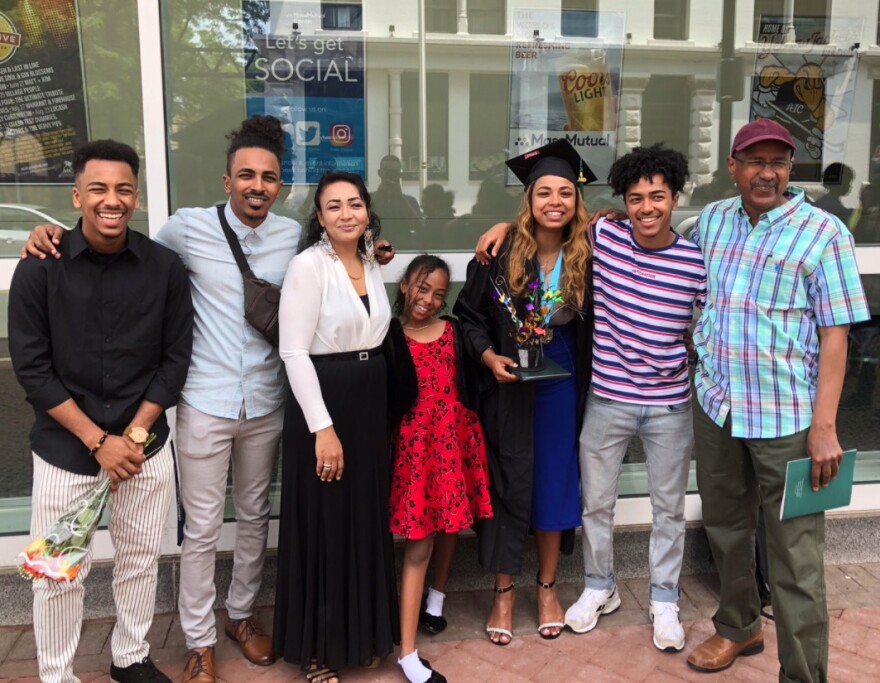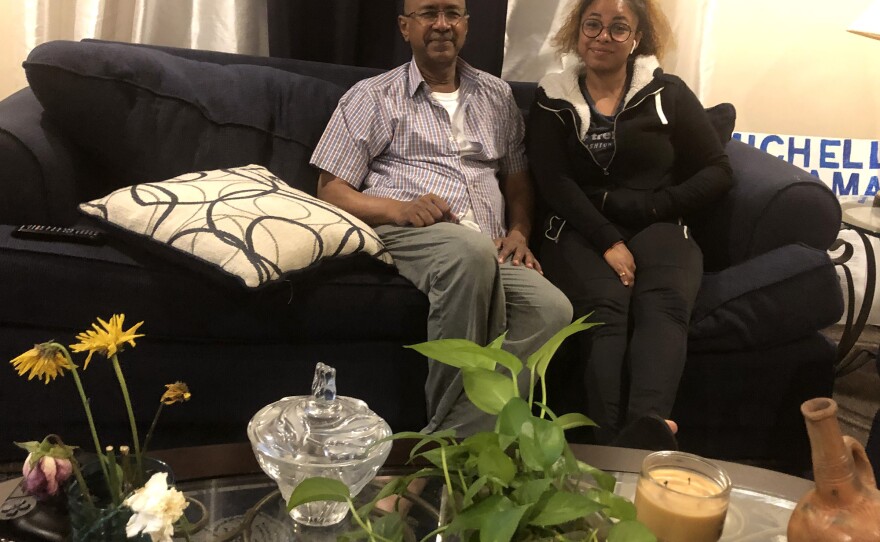Ithar Gabriel will never forget the day her father, Hamror, told her they had been accepted to move to the United States as Sudanese refugees.
“He checked on his computer and he let us know,” Ithar said. “And we were all screaming and jumping that this day finally came.”
The Gabriel family arrived in the U.S. on the night of September 10, 2015. Ithar said she and her siblings were nervous. But their father had other feelings.
“For me, it was really deep breath,” Hamror said. “It's not like for them — they were seeing the darkness and feeling the cold, but I was feeling something different that finally, I made it.”

The family now lives in West Springfield, Massachusetts. They’ve been closely following the popular uprising in Sudan in recent months, with a mixture of hope and fear for friends and family in the northeast African nation.
Fearing political persecution, the family had left behind everything to flee Sudan. They were able to begin rebuilding their lives after arriving in West Springfield.
Their attention was drawn back to Sudan late last year as news poured in of massive protests erupting in the nation’s capital, Khartoum. The Gabriels, along with expatriates around the world, began to use Facebook to fundraise for the activists.
A steady stream of social media posts emerging from a major sit-in helped the family feel connected to the movement. They even learned the protest anthems.
But everything changed for the movement on June 3.
Ithar and Hamror remember they were at home and began to see reports on social media that the military in Khartoum was mobilizing. It was shortly before dawn in Sudan when security forces stormed the sit-in.
“Some people were able to connect to the Wi-Fi,” she said, “and once they connected the Wi-Fi a little bit, they share stuff to the social media.”
The Gabriels watched the online videos in horror from afar. There were clips of protesters being killed by soldiers.
“It's very difficult to look at it. It's very heartbreaking,” Ithar said.
Ithar was frantically scrolling between the social media accounts of her friends in Khartoum. Suddenly, one of her friends, Ahmed, went silent. Ithar was desperate to make sure he was OK.
Many Sudanese were in the same position, having lost contact with loved ones in the chaos.
“We even created a whole hashtag on Twitter, putting the pictures of all the people that are lost with their names, so that people can let us know if they find them,” Ithar said.
After a long period of searching social media for news of Ahmed, Ithar finally confirmed he was safe. But many people did not receive good news on that day.
“And then another friend of mine also — he put a picture of his friend,” Ithar said. “And he was like, it's my friend, I can't find him. And then people responded to him. They were like, ‘Sorry. He's dead.’ He was like, ‘Don't tell me. Don't tell me something that you guys are not sure of,’ because he didn't want to believe it at that moment.”
Ithar said she remembers waking up the next morning having seen all the pictures and videos, and people talking about it.
“Everybody was really sad,” she said. “I don't think anyone cried more than that day, ever. Every Sudanese person was hurt.”
It’s been more than six weeks since the massacre on June 3. And despite the wounds from that day, protest leaders are working to finalize an agreement with the military for an eventual transition to civilian rule.
The Gabriel family, meanwhile, continues to build their lives in West Springfield.

Ithar just graduated from Holyoke Community College. Hamror is working as a building inspector for the city of Springfield.
The family will be eligible to apply for American citizenship soon.
But even so, when I asked Hamror what his dreams for the future were, Sudan was on the front of his mind.
“The dreams now are concentrated back home,” he said. “Now we are looking back there.”
For the Gabriels, and the Sudanese community across the world, that may be the case for a long time to come.







